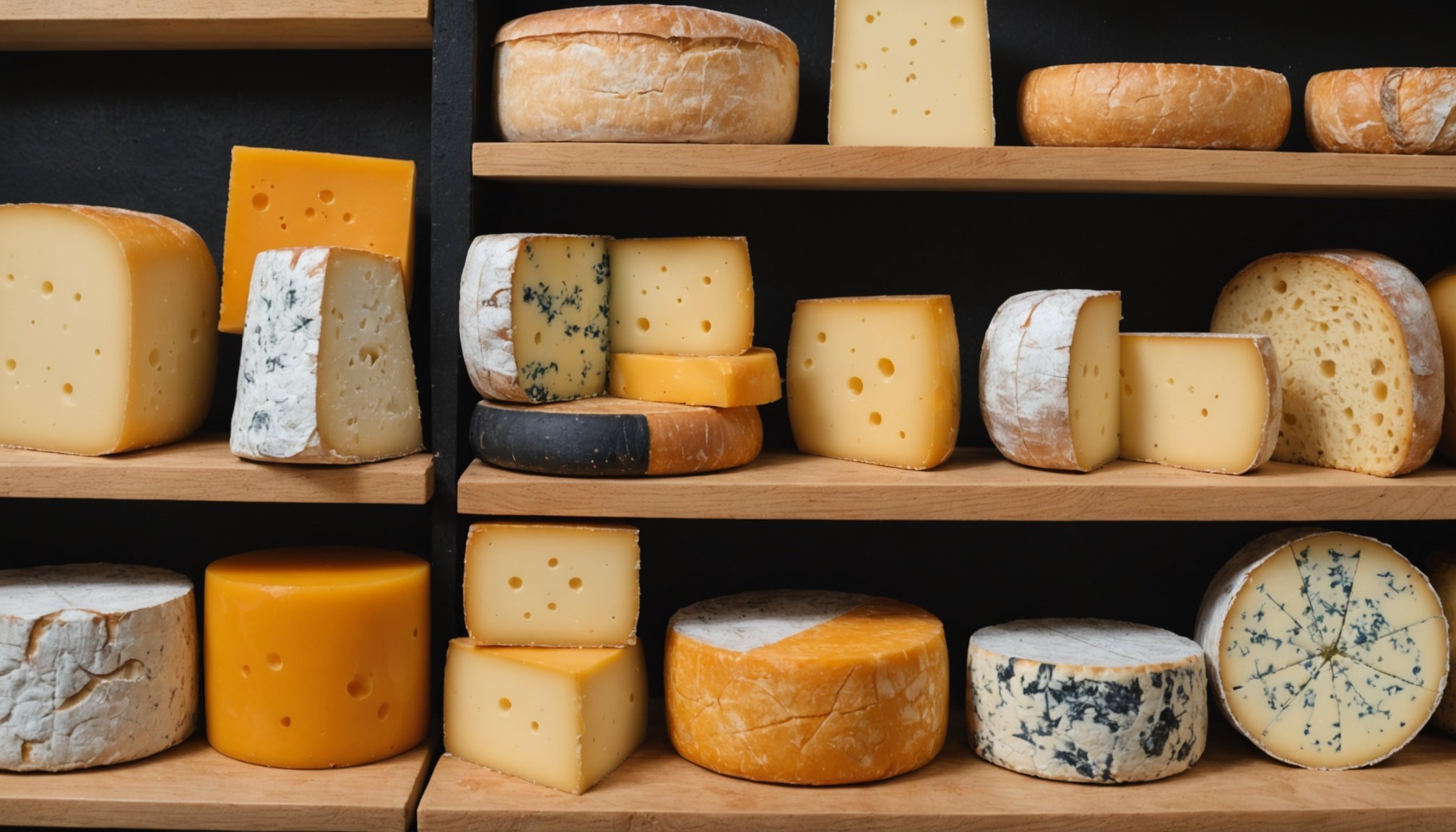Analysis of the Post-Brexit Landscape for UK Specialty Cheeses
The post-Brexit impact on the UK cheese market has brought about notable regulatory changes. Importantly, new certification requirements and standards have emerged, altering the pathway for British cheese exports. Such changes necessitate adaptation and innovation from UK producers to sustain their international presence.
Trade Barriers in the European Market
The reality of post-Brexit trade barriers presents tangible challenges, especially with the European Union, a historically significant market for UK cheeses. Tariffs and non-tariff barriers, like quotas and customs checks, contribute to increased costs and complexity in logistics, impacting the UK cheese market adversely.
In parallel : Unlocking Customer Engagement: Innovative Ways UK Retailers Can Leverage Augmented Reality
In response to these trade barriers, adaptation is paramount. Producers must navigate intricate regulations, understanding both the nuanced import duties and the documentary requirements that may influence trade dynamics.
Opportunities for Niche Marketing
Despite challenges, there remain market opportunities. Consumer trends in Europe are shifting towards artisanal and locally-sourced products. UK specialty cheeses hold potential here, tapping into demand for unique flavours and quality craftsmanship. Innovating niche marketing strategies could align with these trends, creating opportunities in previously unexploited European markets.
This might interest you : Unlocking Efficiency: AI Strategies for Enhanced Stock Management in UK Grocery Stores
For producers willing to adapt and invest in brand development, the post-Brexit environment doesn’t just present obstacles; it offers a chance to redefine and enhance the global appreciation for British specialty cheeses.
Strategies for Overcoming Trade Barriers
Understanding and navigating new compliance requirements is essential for businesses aiming to thrive in international markets. Compliance often includes thorough documentation related to tariffs, export licenses, and import quotas. Adapting to these requirements promptly can mitigate delays and reduce the risk of penalties. Efficient strategies for export compliance involve maintaining a robust documentation system to track all necessary paperwork.
Effective logistics strategies play a pivotal role in streamlining distribution processes. By optimizing routes, employing advanced logistics solutions, and leveraging technology, companies can reduce shipping times and operational costs. Regularly reviewing and updating logistical networks ensures resilience against unforeseen disruptions, such as geopolitical tensions or supply chain instability.
To tackle trade challenges more efficiently, businesses may benefit from partnering with trade organizations. These entities can offer invaluable support through resources like intelligence reports, networking opportunities, and guidance on navigating complex trade landscapes. Engaging with such organizations enables firms to access specialized knowledge and tools vital for overcoming trade barriers.
By integrating these approaches—compliance readiness, streamlined logistics, and strategic partnerships—businesses can position themselves advantageously in the competitive global marketplace. This pragmatic methodology encourages companies to not only meet but exceed their operational and strategic goals.
Exploring New Markets Within Europe
Expanding into new markets within Europe can be a promising venture, especially with the European cheese market growth showing significant potential. Understanding consumer preferences in key European countries is essential. Examining demographic data aids in identifying target audiences eager for a unique cheese experience. By analyzing tastes and preferences, businesses can segment the market effectively, ensuring tailored approaches to resonate with diverse European palates.
Identifying Potential Markets
Finding suitable locations for cheese promotion requires nuanced insights. Countries like France, Germany, and Italy, rich in cheese traditions, are essential targets. Analyzing local consumer preferences reveals unique flavor profiles and consumption habits that drive market segmentation. Adapting offerings to fit these tastes assures better alignment with demand, maximizing market penetration.
Tailoring Marketing Strategies
For a successful entry, customizing marketing strategies to cater to regional tastes is crucial. Incorporating local cultural elements into campaigns enhances engagement, capturing the attention of distinct audiences. Showcasing respect and understanding of regional nuances helps forge connections with consumers.
Building Brand Awareness
Partnerships with local retailers and distributors are pivotal in establishing credibility and reach. Such collaborations can increase visibility and trust among target audiences. Additionally, a robust online presence helps tap into wider markets, allowing cheese brands to connect directly with potential customers, boosting recognition across Europe.
Case Studies of Successful Campaigns
Exploring how successful cheese marketing campaigns have made an impact in the UK reveals valuable strategies for emerging brands. Notable examples include campaigns by established cheese brands focusing on authenticity and unique flavour profiles. For instance, a well-known UK cheddar brand leveraged storytelling around its heritage and artisan techniques. By emphasising its traditional crafting methods, the brand captured consumers’ imaginations and taste buds, leading to significant sales spikes.
Lessons from Marketing Initiatives
Case studies also highlight key lessons learned from these endeavours. Brands that prioritised engaging content, such as cookery demonstrations or pairing guides, saw increased consumer engagement. This approach not only educated potential customers but also fostered a community feeling. Success is often found in a blend of traditional advertising and digital presence, harmonising past authenticity with modern accessibility.
Insights into Consumer Responses
Understanding the consumer response to these campaigns is crucial. Consumers tend to resonate with brands that offer transparency and ethical production practices. Successful campaigns effectively showcased these elements, leading to enhanced trust and loyalty. As a result, not only did sales increase, but there was a noticeable uplift in brand advocacy. The best practices from these campaigns focus on consumer-centric storytelling and leveraging digital platforms for wider reach.
Leveraging Digital Marketing and Social Media
Navigating the intricacies of digital marketing strategies can significantly boost your brand’s visibility, especially in niche markets like specialty cheeses. Selecting the right social media platforms is crucial. With their visually rich nature, Instagram and Pinterest are exceptional for showcasing the uniqueness of specialty cheeses. They allow businesses to engage with audiences effectively through tantalising images and engaging content.
Being proactive with your social media engagement is just as vital. Engaging consistently with your audience not only keeps your brand in their minds but also builds a community around your product. To resonate with consumers, focus your content creation on storytelling and authenticity. Highlighting the journey of your cheese from farm to table can create an emotional connection and spur consumer interest.
Another indispensable component of digital marketing is the strategic use of online advertising, which can amplify your reach. Google Ads and Facebook Ads enable targeting of specific demographics, ensuring your specialty cheeses reach potential buyers who are more likely to appreciate them.
Moreover, leveraging influencers can elevate your brand’s visibility. Influencers, such as food bloggers or chefs with a following, can authentically advocate for your brand, giving it credibility and creating buzz around your products. By incorporating these strategies, you can effectively harness digital marketing to your advantage.
Understanding Consumer Preferences and Trends
As we dive into consumer trends in cheese consumption, it’s crucial to acknowledge how consumer attitudes toward UK cheeses have evolved, particularly post-Brexit. This significant event has impacted the cheese market, reshaping preferences and encouraging a closer look at local products.
Consumers are increasingly interested in unique cheese attributes such as texture, origin, and flavor profiles. Trending flavors include bold, robust options that resonate with adventurous palettes. In addition to taste, the ethical and sustainable sourcing of cheese plays a vital role in influencing purchasing decisions. Consumers now demand transparency and responsibility from brands, favouring those with green credentials.
Market research highlights that younger generations, in particular, are driving this shift towards sustainability. They seek cheeses from producers who prioritise environmentally-friendly practices and fair treatment of workers. It’s no longer just about the cheese on the plate; it’s about the story behind it.
Understanding these preferences requires comprehensive market research. By closely examining consumer feedback and purchasing patterns, producers can tailor their offerings to align with these trends. This not only elevates their brand but also ensures continued engagement with a conscientious consumer base.
Regulatory Challenges and Compliance Insights
Understanding the regulatory requirements for food exports is crucial for UK cheese producers aiming to maintain and expand their presence in the EU market. The landscape is heavily influenced by rigorous EU regulations impacting cheese imports. Key regulations include stringent labelling standards, sanitary requirements, and quality assurance protocols designed to ensure consumer safety and product integrity.
UK producers face compliance challenges as they navigate these complex regulations. It demands a multifaceted approach including rigorous documentation and continuous adaptation to evolving guidelines. One effective compliance strategy involves maintaining an updated knowledge base on EU regulatory changes and aligning production processes accordingly. Employing dedicated compliance officers can further streamline adherence to these demanding standards.
Trade policies play a significant role in shaping the export potential for UK cheese. Post-Brexit trade agreements have added layers of complexity to existing regulations, requiring producers to remain vigilant about legal obligations.
Governmental support is critical in helping producers tackle these challenges. It can come in various forms such as financial assistance, training programs, and legal guidance. By providing these resources, governments can empower cheese producers to successfully adhere to global trade policies and effectively compete in the international market.










